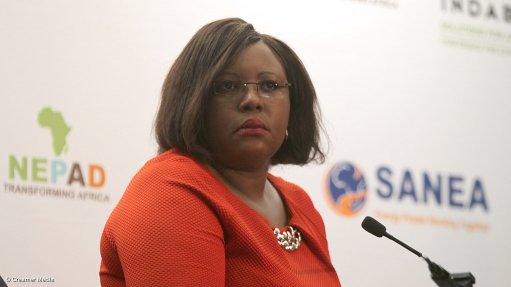
Zambia Energy and Water Development Minister Dora Siliya
Photo by: Duane Daws
The Energy Ministers of Zambia and Zimbabwe reaffirmed their commitment on Tuesday to accelerating the development of the ‘Zizabona’ electricity transmission interconnector, which is seen as critical to stimulating investment in new generating capacity in the power-stressed Southern African region.
As implied in its name, the project would facilitate power trade across Zimbabwe, Zambia, Botswana and Namibia, ease congestion on the existing north-south transmission corridor from South Africa to Zimbabwe and add a 400 kV western corridor to the Southern African Power Pool.
It has been estimated previously that the project, which could involve a capital investment of more than $220-million, would be able to support the transfer of 600 MW of electricity arising primarily from existing and future hydroelectric plants located in Zambia and Zimbabwe.
Addressing the Africa Energy Indaba in Johannesburg, Zambia Energy and Water Development Minister Dora Siliya argued that, despite the country’s current drought-induced electricity crisis, Zambia still had ambitions to expand its hydroelectric footprint.
As a result of the drought, water levels at Kariba dam, which straddles Zambia and Zimbabwe, were currently standing at only 12%, which had resulted in the Kariba hydro plants operating at well below capacity. Zambia had capacity to produce about 2 300 MW, mostly from hydro plants, but was producing at well below those levels, leading to frequent power interruptions.
Siliya said Zambia and Zimbabwe remained keen on the development of the 2 400 MW Batoka Gorge Hydro Scheme, which could involve an investment of $5-billion. In light of resource constraints, both countries would be looking for the private sector to take the investment lead.
Zimbabwe Energy and Power Development Minister Samuel Undenge acknowledged that the project, as well as others being mooted, would require a tariff that offered investors an economic return. Therefore, the Southern African Development Community had agreed on the need for countries in the region to transition towards cost-reflective tariffs by 2019; a move that was seen as critical to incentivising investment by independent power producers.
However, Batoka Gorge would also require regional offtake, which would depend materially on the availability of transmission infrastructure, which, in turn, would require “greater regional cooperation” on interconnector projects, such as Zizabona.
There was an urgent need to complete the feasibility study for Zizabona and the African Union Commission’s Dr Elham Mahmoud Ahmed Ibrahim indicated that the organisation would be willing to take up the cause with the African Development Bank, which would be meeting in Zambia in March.